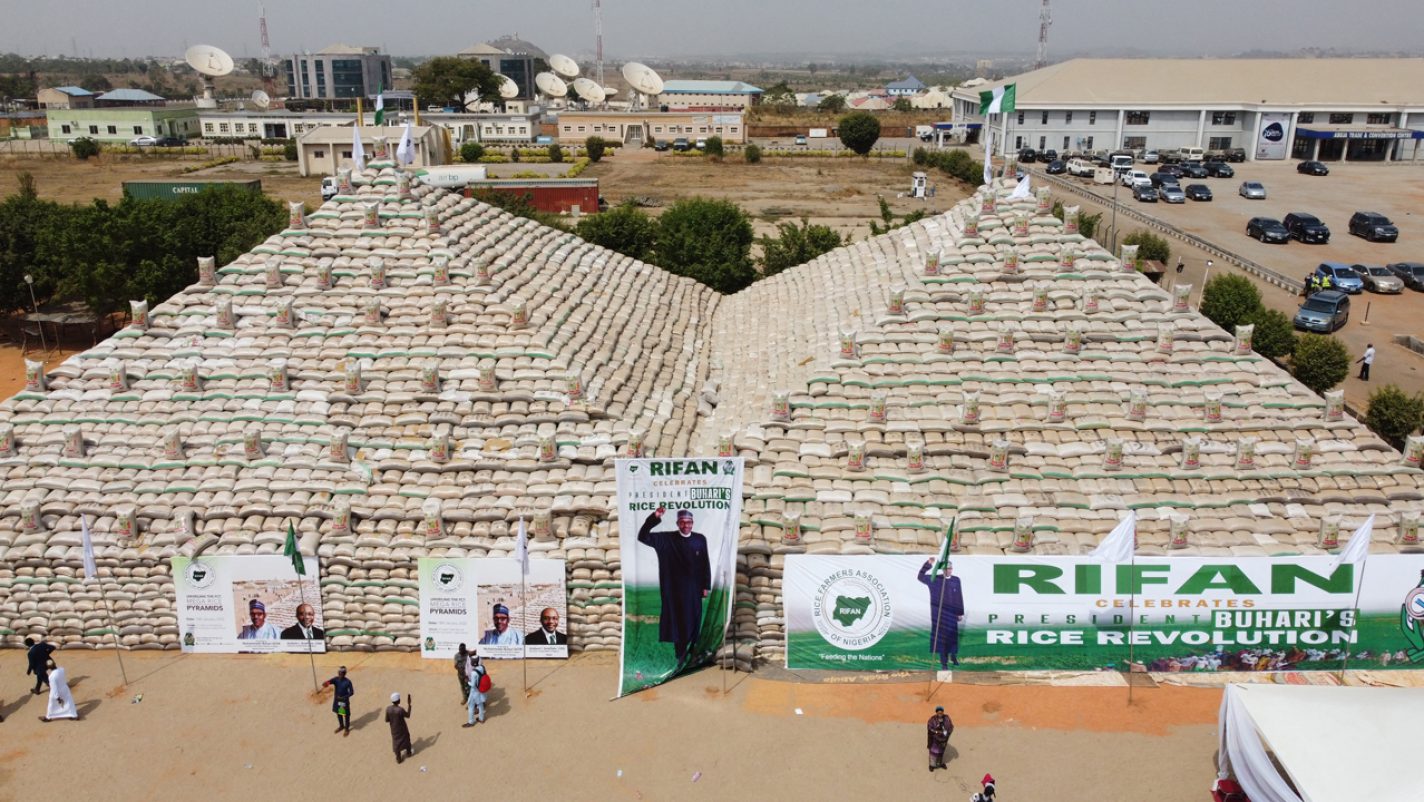Nigeria has taken several steps to drive a sustainable agricultural sector, including the decision to close its land borders for two years, with the end goal to prosper farmers, ensure food balance and nutritional security, attract the unemployed youth population and promote quality of life for its citizens.
The West African country has a vast amount of arable land and is distinguished by the diversity of its ecosystems, an advantage for growing a broad range of nutritious crops and contributing significantly to economic development. According to data obtained from the National Bureau of Statistics (NBS), the agricultural sector contributed N41 trillion to the country’s Gross Domestic Product (GDP) in 2021.
With an estimated population of 216 million, Nigeria is without contest the leading agricultural power and the largest market in West Africa. But the demand for the production of staple foods such as rice, beans, maize, yams, cassava, sorghum and, millet, cannot be met due to the rising population and insecurity.
Currently, an estimated 2 million children in Nigeria suffer from Severe Acute Malnutrition (SAM), but only two out of every 10 children affected are currently reached, according to UNICEF. Also, a report by the Integrated Food Security Phase Classification (IPC) estimated that over 151,000 pregnant and lactating women will likely be acutely malnourished in 2022.
Rice is one of the most common foods consumed in Nigeria because of its nutritional benefits and versatile nature. It can be made in various forms such as white rice with stew, fried rice, jollof rice, coconut rice, tuwo shinkafa and masa.
President Muhammadu Buhari has insisted that Nigeria must grow what it eats and several states like Benue, Borno, Cross River, Ebonyi, Enugu, Kaduna, Kano, Katsina, Kebbi and Taraba now cultivate and process their own rice.
“Because of our policies and investments in the last seven years, towards achieving food security, Nigeria is today much better prepared to cope with the inevitable disruptions in global agricultural supply chains occasioned by Covid-19 and the Russia-Ukraine war.
“We have always been very conscious of the need to achieve food security in Nigeria, and to encourage our local farmers and rural economies. Today, Nigerians are eating home-grown rice,” President Buhari said recently.
The unquenched appetite for foreign rice drives smuggling aided by corrupt officials
Despite efforts to encourage whole grain home-grown rice and its nutritional benefits over parboiled rice, the appetite of Nigerians for the latter remains unquenched and is now the driving force behind smuggling activity in the sector. Between April and August, the Nigeria Customs Service (NCS) reported seizing at least 17, 625 bags of foreign parboiled rice smuggled into the country.
In 2021, the production of milled rice in Nigeria was estimated to amount to five million metric tons, while the annual consumption volume is 6.7 million metric tons, resulting in a deficit of almost two million metric tons which smuggling activities seem to fill. The Senate last November said about two million metric tons of rice were being imported or smuggled into the country.
Besides the fine finish of the foreign parboiled rice which Nigerian consumers find very appealing, the cooking time is also shorter, helping families save time, energy and money in a country where 12kg of gas is selling for N11, 000.
A businesswoman who sells both local and smuggled foreign rice in Bariga, Lagos state, admitted she and her family eat foreign rice because they find it to be sweeter and less soggy.
“My children are very selective. I don’t know whether its because I’m selling rice. They don’t like the local rice because of the brown colour and stones. For me too, it is too starchy and takes a longer time to cook,” she said.
While some of the rice smuggling activities are carried out at night using unconventional routes to evade security agents, others are done in broad daylight aided by security officers posted to man the borders, as confirmed by multiple sources who spoke to TheNewsGuru.com (TNG).
Around the Seme border which shares a boundary with the Benin Republic, towns like Isaga, Ibara, Joga Orile, Iboro, Imasahi, Ilaro, Ilobi, Igbogila, Sawon, Aiyetoro, Igan Okoto, Igon Alade, iguwa, Ipokia, Oke, lewo and Alamala, among others provide a haven for smugglers. In the Niger border axis, it is communities like Sabon-Garin, Mai-Dabarau, Gadirge, Korama, Alele, Bayan Bariki, Raini and Wayo that provide a base for smuggling activities.
A ferry owner operating at the Seme border told our reporter that he imports goods, including contraband items like fairly used clothes and shoes, from Burkina Faso, Benin Republic, and Togo into Nigeria for his business clients, but not without “settling” Custom and Navy officials. By settling, he means giving bribes.
The commercial ferry operator explained to our reporter that rice smuggling remains a risky but very lucrative business and a 50kg bag of rice is bought for N10, 000 – N11, 000 from Benin Republic and sold for between 16,000 – N17, 000 in the towns and villages close to the border and N30, 000 – N36, 000 in other cities across Nigeria.
“Things for the Benin side dey cheap more than Nigeria own. This rice wey dem dey sell twenty-something thousand, that place na between. Custom go seize, dem no go carry am go Ikeja they go find one truck (sic) this one na midnight business I dey tell you o.
“They fit seize like 100 bags look for somebody when they go sell am to for N15, 000 each and they go carry am from here to north; no any custom go stop them,” he said in Nigerian pidgin English.
To corroborate this account, several other border sources said while transporting the smuggled rice to other parts of the country, the smugglers always mention the names of their principals at every checkpoint to allow them to go freely. Some of them even have stores or warehouses around the border area.
Government’s response
The Nigerian Government has consistently said that the rice produced in Nigeria is sufficient to meet its consumption need, but that markets are being infiltrated with unfit foreign rice because of the mentality of citizens that imported products are better than those locally produced.
Minister of Agriculture and Rural Development, Mohammed Abubakar, said the ministry will continue to partner with security agencies and expressed worry over the renewed activities of rice smugglers, which will jeopardise the gains recorded by the federal government’s home-grown rice programme.
“There is no better time than now to maintain the rice production momentum to achieve self-sufficiency for food and nutrition security, job creation, wealth generation and import substitution,” Abubakar noted.
Vice Chairman of the Senate Committee on Agriculture Muhammad Enagi, has proposed a bill to establish the National Rice Development Council of Nigeria to provide guidance on rice research and organise rice stakeholders to enhance local production. The Bill seeks to establish a rallying point and a comprehensive national operational and governance structure for a complete rice value chain.
According to him, “Nigeria should consider putting in place a National Rice Development Council and a comprehensive national rice development roadmap that will guide the country into self-sufficiency and export”.
The Comptroller of the NCS Katsina Area Command Dalha Wada Chedi, said smugglers would not be allowed to sabotage the huge amount of resources invested in the production of rice and frustrate the efforts of smallholder farmers.
“I am sorry for smugglers because a new strategy has been put in place to checkmate smuggling, and we will follow them from nooks and crannies of the state. We will make things very uncomfortable for them,” he said.



